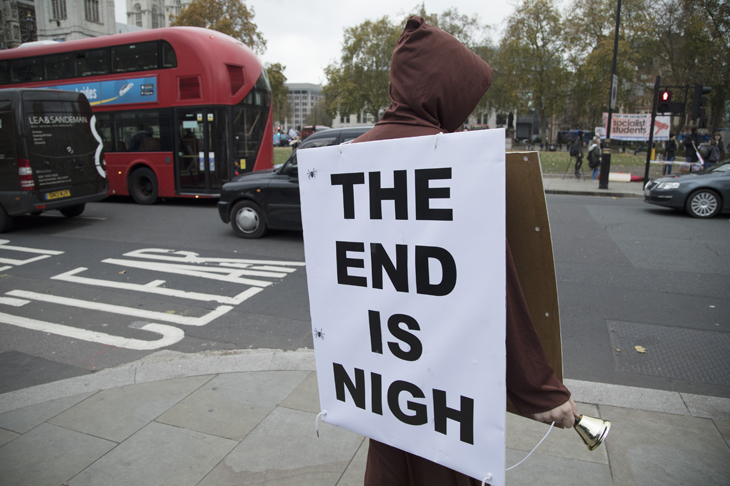As an American coming of age at the butt of the 1960s, I celebrated self-loathing. Everything about the United States was shameful: its shallow consumerism, its environmental rapacity, its worship of money, its racism, its political assassinations, its catastrophic involvement in Vietnam. Everything about the American past was shameful, too: slavery, the massacre of Native Americans, the arrogance of manifest destiny. No surprises. At the time, these views constituted a set menu.
Yet amid all this wallowing in ignominy, did I feel, myself, ashamed? Nah. Sure, I claimed to. But the sensation of genuine disgrace is soul-destroying. Drenched in actual shame, you don’t want to leave the house — and I was eager to hit the pavement with placards. In truth, the dominant emotion of my hippie period was exhilaration. I gloried in shaming my country, an aggressive, transitive construction that leaves the agent of the verb above reproach — like hosing down a crowd of muddy urchins in the backyard and not getting wet.
When I began what has become a protracted expatriatism, Americans had a reputation abroad for being loud, crass, boastful and fat (not any more; now everyone is fat). Eager to distance myself from the crap stereotype, in social settings I leapt to denigrate both my country and my countrymen, as if by deploring my origins I could earn myself out of them. Still young, I hadn’t yet registered that this is a commonplace impulse for American liberals (a cliché I subsequently sent up in We Need to Talk About Kevin): to frantically trash the United States as if crossing some magic threshold of faux self-disgust means you finally get to hail from somewhere more sophisticated instead.
I’ve grown up a bit (though, alas, maturity is still a work in progress) and long ago ditched the ritual lambast of the dreadful USA. That I am American is a fact, and defying plain facts is a formula for making a fool of yourself. Denying your own people is unattractive, too; my contemptuous disassociation from my homeland was surely off-putting to the very foreigners I’d been trying to please. I didn’t choose to be American, but there are worse nationalities to be born into. I don’t consider myself one of David Goodhart’s ‘anywheres’, but I do feel deeply tied to more than one place, and the complexity is a pleasure.
This is all to say that the many British students obsessed with exposing institutional racism, decolonizing the curriculum, cleansing reading lists of white male English authors and abhorring the history of empire — well, they spark a sheepish recognition. I recognize the intoxication of their self-righteousness, the insincerity of their shame, and the futility of their implicit conviction that decrying their wretched heritage will earn them exemption from it. Yup. That was me.
It’s not as if I now advocate slavery or genocide, though their denunciation seems ethically obvious and no longer gives me a thrill. Sure, being clear-eyed about past atrocities is all to the good. But the show-off hair-shirtery in vogue in my own youth and resurgent on the left today risks validating the principle of inherited guilt — meaning that we keep repeating this fruitless and fundamentally fake process of endless expiation. I don’t believe in visiting the sins of the mothers and fathers (there’s a little gender equality for you) upon the sons and daughters. Pity the German young people still force-fed the Holocaust with an aim to handing on not only a history lesson, but a moral taint. Blaming contemporary 18-year-old Germans for Auschwitz isn’t fair when it’s hard enough to take responsibility for your own mistakes. I’m fittingly chilled that the original American constitution counted a black inhabitant as three-fifths of a human being, but that oughtn’t make me feel implicated. The fashionable but poisonous concept of ‘privilege’ implies that no penance can ever erase the infinitely transferrable stain of ancestral villainy.
During my extensive residence in the UK, my sense of cultural identity has broadened. I’m less apt to latch solely on to the United States, a relatively young country — fast-forwarding towards senescence — than to embrace the greater legacy of western civilization. But that is a civilization whose elite are now in love with self-castigation, excited by self-flagellation, and in thrall to the simulacrum of shame. It isn’t just the kids.
Granted, if we don’t inherit guilt, we don’t inherit credit, either. The attainments of our forbears are not our personal accomplishments. I didn’t write the St Matthew Passion or paint the Sistine Chapel. Yet it’s still the job of us alive people to communicate our past to our future, and our birthright comprises more than dishonor. There’s a place for lamenting depravity and injustice. But is the problem embarrassment? Or feigned humility? For consider the West’s countervailing achievements: the artistic masterpieces, from Mahler’s Ninth to Madame Bovary; the philosophy, from Aristotle to Kant; the architectural marvels, from the Parthenon to St Paul’s; the scientific, technological and medical breakthroughs. For our intellectual class to focus solely on condemning western wrong-doings to the exclusion of commemorating our culture’s triumphs is beyond perverse. It is a sickness.
So when Notre-Dame was engulfed in flames last week, the West went through a rare communal experience of psychic health. In a sense, an edifice of such splendor belongs to the whole world; in a more specific sense, it belongs to France. Yet in that middle range of ownership, it was curative for Europeans and members of the continent’s diaspora like me to unite in sorrow, and thereby, in our mutual mourning, for once to cherish an emblem of the West’s most sublime aspirations. It benefited us secular sorts, too, to acknowledge the existence of the culturally sacred. As the spire toppled on Sky News and millions of throats caught in concert, the collective grief was an odd relief. Love of what you’re losing is still love. I just wish that for us to fully appreciate the fruits of our own civilization they didn’t have to be on fire.
This article was originally published in The Spectator magazine.


















